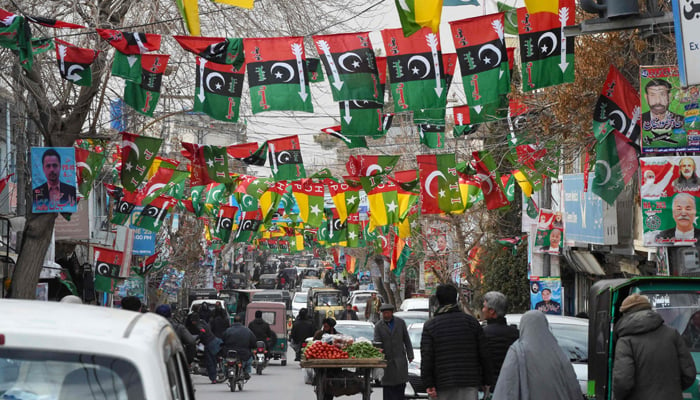Key reasons behind voter choices in Pakistan since 1993
Most voters, who have chosen the PPP since 1993, said that their vote was due to their loyalty to the party
ISLAMABAD: The primary reason why people cast their votes for their favourite political party is to have their government-related issues resolved, such as police and court matters, as revealed by Gallup Pakistan’s book on previous elections since 1993.
Other significant reasons cited by voters included development initiatives, loyalty to respective political parties and the belief that their chosen party is more competent than others. The most common reason given by voters of the PMLN was their desire for development initiatives. The second most cited reason among the PMLN voters was the expectation that their court and police-related issues would be addressed under their preferred political party.
Most voters, who have chosen the PPP since 1993, said that their vote was due to their loyalty to the party. In contrast, the voters who supported the PTI in past elections, said they chose the respective party because they wanted their police and court matters, among other issues, to be resolved.
Gallup’s book on the past 11 general elections of Pakistan reveals that from 1993 till 2018, in the past six elections, the majority of people voted because they wanted their police and court matters resolved and were seeking representation from the elected leader.
Furthermore, 21 percent of the total participants in the past six elections said they voted because they wanted their government-related matters resolved under their chosen political parties. Whereas 19 percent of the total voters said they voted for their preferred candidate because they sought development work in their respective areas and throughout the country.
Moreover, 16 percent of the total voters cast their votes out of loyalty to their political parties, making it the third most common reason for voting.
Thirteen percent of the total voters in the last six elections believed their chosen political party to be more competent than others. Similarly, another 13 percent of the public mentioned they chose their political party based on religious beliefs and honesty. Eight percent of the voters cast their votes due to personal relations with the candidate from their community.
Two percent of the people voted for their preferred party because they wanted another party to lose. Four percent of the voters cited other reasons, while three percent stated they didn’t know why they chose any political party.
-
 Kylie Kelce Reveals Rules She Wants Daughter Bennett To Learn At 3: No More 'passies'
Kylie Kelce Reveals Rules She Wants Daughter Bennett To Learn At 3: No More 'passies' -
 Smartphone Market Set For Biggest-ever Decline In 2026
Smartphone Market Set For Biggest-ever Decline In 2026 -
 Mud, Rain, Loincloths: All About Japan’s 200-year-old Harvest Wrestling Ritual
Mud, Rain, Loincloths: All About Japan’s 200-year-old Harvest Wrestling Ritual -
 Jonathan Majors Set To Make Explosive Comeback To Acting After 2023 Conviction
Jonathan Majors Set To Make Explosive Comeback To Acting After 2023 Conviction -
 Next James Bond: Why Jacob Elordi May Never Get 007 Role?
Next James Bond: Why Jacob Elordi May Never Get 007 Role? -
 Maddox Drops Pitt From Surname In Credits Of Angelina Jolie’s New Film 'Couture' Despite Truce From Father's End In Legal Battle
Maddox Drops Pitt From Surname In Credits Of Angelina Jolie’s New Film 'Couture' Despite Truce From Father's End In Legal Battle -
 Meghan Markle Adds Diamonds To Engagement Ring For Jordan Trip
Meghan Markle Adds Diamonds To Engagement Ring For Jordan Trip -
 Burger King Launches AI Chatbot To Track Employee Politeness
Burger King Launches AI Chatbot To Track Employee Politeness -
 Andrew’s Woes Amid King Charles’ Cancer Battle Triggers Harry Into Action For ‘stiff Upper Lip’ Type Dad
Andrew’s Woes Amid King Charles’ Cancer Battle Triggers Harry Into Action For ‘stiff Upper Lip’ Type Dad -
 Experts Warn Andrew’s Legal Troubles In UK Could Be Far From Over
Experts Warn Andrew’s Legal Troubles In UK Could Be Far From Over -
 Teyana Taylor Reflects On Dreams Turning Into Reality Amid Major Score
Teyana Taylor Reflects On Dreams Turning Into Reality Amid Major Score -
 Jennifer Garner Drops Parenting Truth Bomb On Teens With Kylie Kelce: 'They're Amazing'
Jennifer Garner Drops Parenting Truth Bomb On Teens With Kylie Kelce: 'They're Amazing' -
 AI Is Creating More Security Problems Than It Solves, Report Warns
AI Is Creating More Security Problems Than It Solves, Report Warns -
 'Game Of Thrones' Prequel 'A Knight Of The Seven Kingdoms' New Ratings Mark Huge Milestone
'Game Of Thrones' Prequel 'A Knight Of The Seven Kingdoms' New Ratings Mark Huge Milestone -
 Apple Seeks To Dismiss Fraud Suit Over Siri AI, Epic Injunction
Apple Seeks To Dismiss Fraud Suit Over Siri AI, Epic Injunction -
 Delroy Lindo Explains The Crucial Role Of Musical Arts In Setting Up His Career Trajectory
Delroy Lindo Explains The Crucial Role Of Musical Arts In Setting Up His Career Trajectory




